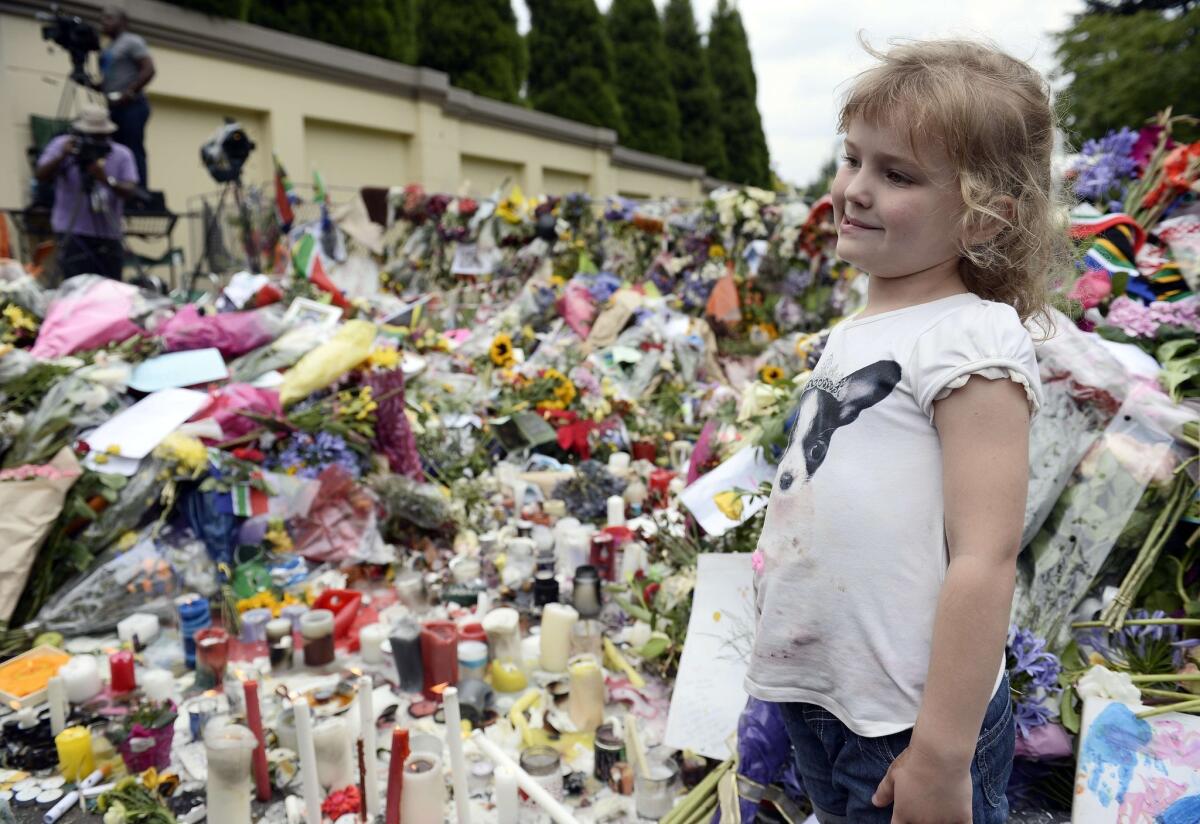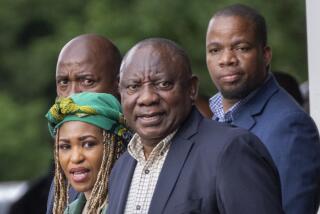Mixed feelings about Mandela in South African mining town

FOCHVILLE, South Africa -- In Fochville, a mainly Afrikaner mining town about 30 miles southwest of Johannesburg, not everyone wants to talk about the legacy of Nelson Mandela.
âNo thank you,â said one white man, his face hardening at the mention of the name before he turned and walked off.
Another middle-aged white man stalked away swiftly: âIâm unemployed right now. Heâs done nothing for me. Iâve got a negative point of view.â
A white-haired Afrikaner man glared and said that two minutes was too long for an interview on Mandela.
In the days since Mandela died, alarmist messages have been circulating on Facebook in the Afrikaans language, according to locals, reviving old warnings that black South Africans would butcher whites when the former presidentâs life ended.
The fear, associated with extremist right-wing white groups, is based on the theory that Mandela was the only figure of restraint in the ruling African National Congress. Itâs not taken seriously by analysts and most whites, since Mandela had had little or no political influence for many years, but it crops up regularly in certain circles.
Belinda Van Rhyn, 45, a receptionist at a security company, said Facebook messages in Afrikaans warning of race war had been making the rounds again.
âI think thatâs nonsense,â she said. âYou always get negative people. Most of them are positive.â
But life in Fochville, where 71% of residents are white Afrikaans-speakers and many depend on gold mines and agriculture for a living, has been hit hard by a gradual decline in mining. Young white men, almost guaranteed a job under apartheid, feel as though they are last in line, and many blame black economic empowerment.
âThereâs a lot of unemployed [white] people. Theyâre retrenched. They suffer a lot,â said Thys Redelinghuys, 66, a retired mining industry engine driver.
The main street in Fochville has a slightly worn look, though the roads are kept meticulously clean by black municipal workers. On the outskirts of town, a swath of tin shacks where many of the townâs black population lives huddles under a gloomy afternoon rainstorm.
Thereâs a kind of informal, chosen segregation, with some cheap, shabby cafes in the town center occupied solely by blacks and other businesses patronized mainly by whites.
Most whites in Fochville were saddened by the loss of Mandela and saw him as a great man, Redelinghuys said, adding that perhaps 10% were negative or indifferent to his death.
âThey say they donât care if he dies or whatever. They donât change. You canât change them,â he said, adding that many of them were older people with fixed ideas.
In the days of apartheid, said Redelinghuys, âthey worked on your brain. Thatâs something that people make you believe in.
âIn those days, you couldnât say what you wanted to say. Youâd [only] speak about it to your friends and say, âThis is not right,â â he said.
Walter Ericson, 25, said of Mandela: âPolitically heâs a hero, but thereâs stuff he did that was wrong. He was also a terrorist.â
Though Mandela is quite popular among most whites, according to Redelinghuys, the ruling scandal-ridden African National Congress party is not.
âThe ANC promised some things but they didnât deliver, but you canât blame Mandela for that,â said Van Rhyn, the receptionist.
However, the global obsession with Mandela overstates his achievements, she said. âHe was only a person.â
Mandela changed everything when he came out of jail, said Redelinghuys, because of his reconciliation policy.
âWhites have changed a lot, thanks to God and Madiba,â he said, using Mandelaâs tribal name. âWhen he came out, he actually made all of us free.â
ALSO:
Venezuelaâs ruling socialists survive electoral test
North Korean ouster could bring more political turmoil
Russia: Putin dissolves, replaces Soviet-era news agency
Twitter: @latimesdixon
More to Read
Sign up for Essential California
The most important California stories and recommendations in your inbox every morning.
You may occasionally receive promotional content from the Los Angeles Times.










